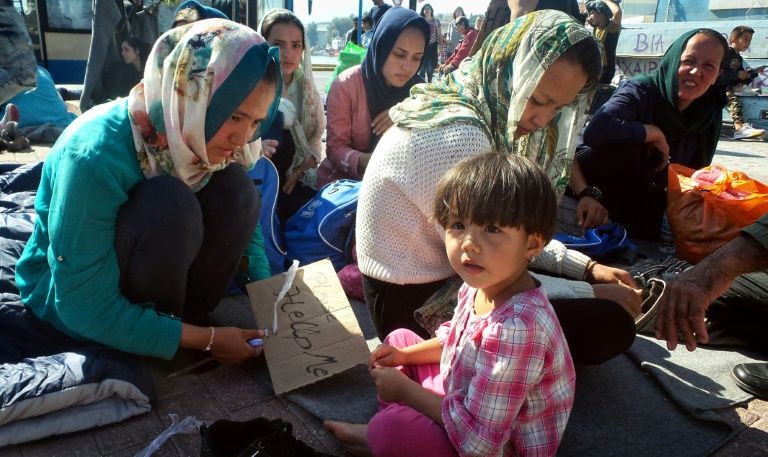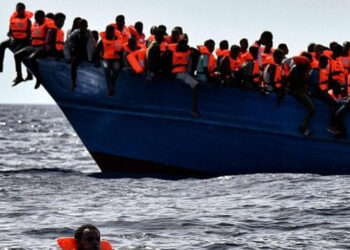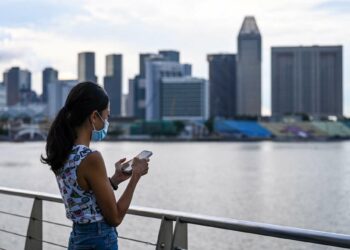“Water, phone, food,” in that order.
According to Marie Gillespie, a sociology professor at The Open University in the United Kingdom, these are now the three most important items refugees take with them when they are unexpectedly forced to leave their homes.
Since the beginning of the Syrian civil war in 2011, over 5.6 million people have fled the country, seeking refuge in countries within the European Union and beyond.
Unlike their predecessors during World War II, today’s refugees have replaced their suitcases with smartphones as they pursue their migratory journeys throughout the region.
Although access to technology and media savviness varies among different groups of refugees based on income and education levels, experts have concluded that smartphones and the ability to access social media platforms through them are now an essential part of a refugee’s toolkit.
“Social media is hugely important at every stage of the migration journey,” Aliyyah Ahad, an associate policy analyst at the Migration Policy Institute, told The Globe Post.
However, the portrayal of the migration experience through social media is not always realistic and can deprive refugees of information on potential barriers they may encounter along their routes.
‘A Dark Digital Underworld’
Today, refugees use smartphones and social media platforms in five primary ways – communication, translation, information, navigation and representation – Gillespie told The Globe Post.
A few key aspects within these categories deserve particular attention.
The first is communication. Not only do smartphones and social media websites help refugees to keep in touch with family and friends, they also connect users to underground networks which often make this international travel possible in the first place.
“In order to make that journey, you have to find an agent,” Gillespie said. “Of course there are legal means but they take a long time and they’re very unpredictable.”
In these situations, refugees frequently turn to a “dark digital underworld,” Gillespie explained, facilitating access to agents and smugglers and allowing for communication with these figures to take place through encrypted Facebook and WhatsApp channels.
During transit, social media and smartphones provide critical services as well.
For many refugees, Gillespie and Ahad agreed that the concept of trust is a huge issue. With conflicting information coming from many different directions, the process of refugee migration is often a confusing one.
In these circumstances, social media and Facebook groups in particular help confirm correct information and challenge ongoing rumor mills.
“A lot of people were using those groups in order to triangulate information between the official government sources and then more word-of-mouth sources because it wasn’t clear what could be trusted and what couldn’t,” Ahad said.
The possession of a smartphone during migration can also be valuable in itself, allowing refugees to complete mobile transactions and directly pay for their transportation expenses.
“A lot of monetary transactions are done over the phone now,” Gillespie said. “So the smartphone in itself becomes a form of currency that’s exchanged, lost, upgraded and downgraded.”
Even post-arrival, these technologies assume new uses and values.
Because of their ability to take and store photos and videos, the smartphones and SIM cards of refugees often contain both positive memories, as well as documentary evidence of the conflict and torture they have experienced.
Upon arrival in their new host-countries, these images become key in confirming their status as refugees through their archived digital passage to Europe and in remembering their past life before it was uprooted.
“You can begin to see how the smartphone contains an archive of photographs, of happy times with the family, but also of the great suffering and sometimes torture and conflict that people have experienced,” Gillespie said.
Ahad pointed out that social media also contributes to making the processes of settlement and integration easier for refugees, allowing for informal networking to take place through outlets like popular Facebook pages and YouTube channels.
“[Social media] is useful for connecting people and allowing them to settle in just by making them aware of what information and services are available, and also giving people an opportunity to draw on these more diffused, looser or weaker ties to find work and other important integration services,” Ahad said.
Inherent Dangers
Despite the myriad of ways in which social media and smartphones make a refugee’s journey easier, these devices are not without their downfalls.
One of these dangers is the reliance on public WiFi, which puts the invisibility that many refugees try and maintain throughout the migration process at risk.
“Managing their visibility and invisibility is very important because basically in order to get to Europe, they become criminalized,” Gillespie said.
As Gillespie’s research further points out, refugees’ phones often leave digital traces through utilizing public WiFi networks and posting on social media, making them increasingly susceptible to surveillance by a variety of state actors, non-state actors and extremist groups.
Potential safety concerns, especially for young women trying to access free WiFi late at night in refugee camps, as well as roaming costs when public WiFi is unavailable, represent two major setbacks refugees face in their quest for digital connectivity.
“It can be difficult, particularly because when you buy a SIM card – at least before the recent changes in E.U. law traveling in Europe – you weren’t guaranteed that you would have roaming in another member state,” Ahad said. “So that could make it really expensive to access internet on the move.”
Social media users including refugees and travel agents can also portray an overly-glamorous migration experience, feeding impractical expectations to those who remain back home.
“Smugglers are very sophisticated advertisers and PR people,” Gillespie said. “So when you go down the dark net, it is certainly the case that the smugglers and agents will portray a very highly idealized image of Europe as a place where you’ll get jobs, housing, access to healthcare and that can actually feed very unrealistic expectations in refugees.”
Government and NGO Presence
Since smartphone and social media use among refugees has skyrocketed, governments, media organizations and NGO’s have now begun to meet refugees in this digital space.
InfoMigrants, a collaboration between France Médias Monde, Deutsche Welle, the Italian press agency ANSA and the European Union, aims to combat misinformation at every point during a migrant’s journey.
Complemented by other NGO-run platforms like Refugee.Info, a project that aims more specifically to help refugees exercise their legal rights, these digital services provide both broad and personalized services to those in need, countering misinformation campaigns by providing authoritative information.
“Once in Europe, again, the smartphone becomes an absolutely vital tool, not only to inform themselves about shifts in migration policy and where the problems and dangers might lie … but because it can really help to fill in the big picture and counter smugglers narratives,” Gillespie said.
‘Easy to Enter’ Yemen Attracts African Migrants Despite Ongoing Crisis



















